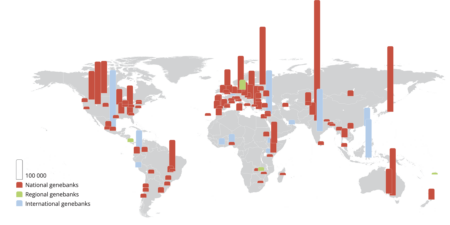I spent all last week at the 20th Session of the FAO Commission on Genetic Resources in Rome: “[t]he Commission is the only permanent intergovernmental body that specifically addresses all components of biological diversity for food and agriculture.” As ever, there’s a great summary of the session at Earth Negotiations Bulletin. Maybe the most significant milestone was the launch of the Third Report on the State of the World’s Plant Genetic Resources for Food and Agriculture, 15 years after the second report. FAO has a nice summary of the key findings. You know how we have been saying that there are 1750 genebanks in the world? Well, we can’t say that any more: due to a tighter definition, there are now 867 genebanks.
If you want some more fun numbers, elsewhere I have blogged about how the work of my own organization, the Global Crop Diversity Trust, is featured in the report.
